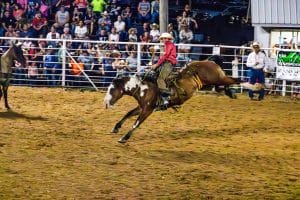FAYETTEVILLE, Ark. — The Arkansas, Texas and Oklahoma agriculture departments are putting horse owners in their states on alert following an outbreak of an easily spread, but preventable virus that can be fatal to equines.
As of Thursday, there have been no cases of the disease reported in Arkansas.
Mark Russell, professor and extension equine specialist for the University of Arkansas System Division of Agriculture, offered some advice: “For the most part, people should keep their horses at home until we know more about the situation.”
On Thursday, the Arkansas Department of Agriculture recommended that all equine events, including shows, competitions, and large gatherings, be postponed for the next two weeks as a precautionary measure to protect the health of horses across the state.
The department also made the following recommendations for horse owners and event organizers:
- Postpone or cancel non-essential equine events during this period.
- Monitor horses closely for any signs of fever, nasal discharge, or neurological symptoms.
- Practice strict biosecurity measures, including limiting horse-to-horse contact, disinfecting equipment, and restricting access to visitors.
- Isolate any horse showing signs of illness and contact a licensed veterinarian immediately.
The Arkansas Department of Agriculture said it would continue to monitor the situation and provide updates as needed.
Some were heeding the warnings. The El Dorado-Union County Chamber said there would be no horses in the Christmas parade, while a White County barn announced it would be closed through Dec. 1 as a precaution. The UA-Monticello rodeo team’s final competition in Kentucky was postponed as well.
Symptoms, treatment and prevention
“EHV is caused by a herpes virus infection in horses,” said Veterinarian Jeremy Powell, professor of animal science for the University of Arkansas System Division of Agriculture.
“EHV is transmitted easily between horses through direct — nose-to-nose — contact, or infections can spread through aerosolized droplets during coughing or sneezing,” he said. “Indirect transmission can also occur through shared water and feed buckets, tack, clothing or boots.”
Once infected, “typically, we can see a wide variety of clinical signs that may include fever, nasal discharge, coughing, lethargy or weakness, neurologic symptoms and abortion in pregnant mares,” he said. “These may be variable with an infection.”
If the virus affects the nervous system, a horse may die due to complications with paralysis and recumbency — extended periods of lying down — which can cause respiratory issues and gastrointestinal damage.
“When horses become infected, veterinarians can provide supportive care and symptomatic therapy, but there is no cure,” Powell said. “Horses that have recovered from the disease can become latent carriers of the infection.”
Infection is preventable, Powell said.
“Horses can routinely be vaccinated for this disease, so owners can check with their veterinarian,” he said.
Advisories in Texas, Oklahoma
On Wednesday, the Texas Department of Agriculture issued an in-state alert of an outbreak of Equine Herpesvirus Myeloencephalopathy — known as EHV-1 or EHM — reported by Texas veterinarians after the recent World Championship Barrel Finals near Waco, Texas, on Nov. 5-9.
Texas Agriculture Commissioner Sid Miller urged all horse owners, trainers, and venue operators who attended or were near the event, or who have recently returned from any large equine gathering in the Waco region in the last 14 days, to act swiftly, monitor their animals carefully, and implement heightened biosecurity measures.
In a Facebook post on Wednesday, Oklahoma’s Department of Agriculture said, “We have confirmed two cases of EHM in horses that attended the Barrel Futurities of America World Championship at Lazy E Arena this week.” The arena is in Guthrie, Oklahoma.
To learn more about extension programs in Arkansas, contact your local Cooperative Extension Service agent or visit www.uaex.uada.edu. Follow us on X and Instagram at @AR_Extension. To learn more about Division of Agriculture research, visit the Arkansas Agricultural Experiment Station website: https://aaes.uada.edu/. Follow on X at @ArkAgResearch. To learn more about the Division of Agriculture, visit https://uada.edu/. Follow us on X at @AgInArk.










More Stories
US Marines of Polk County commemorate 250th anniversary
The Ouachita Trading Post 2025 Halloween Coloring Contest
Safer Internet Month